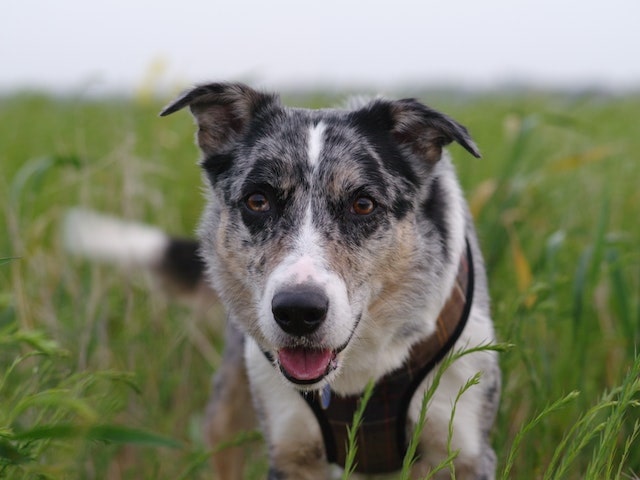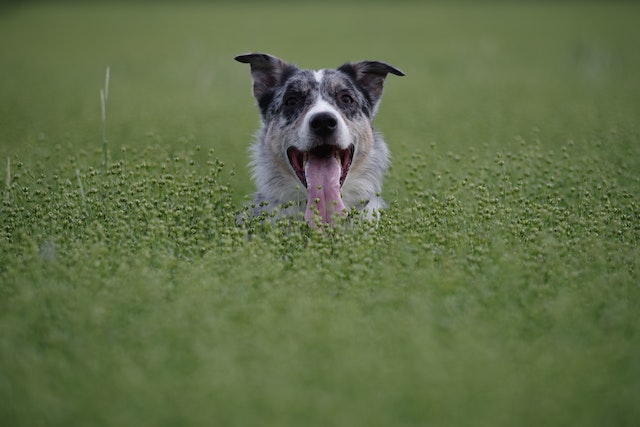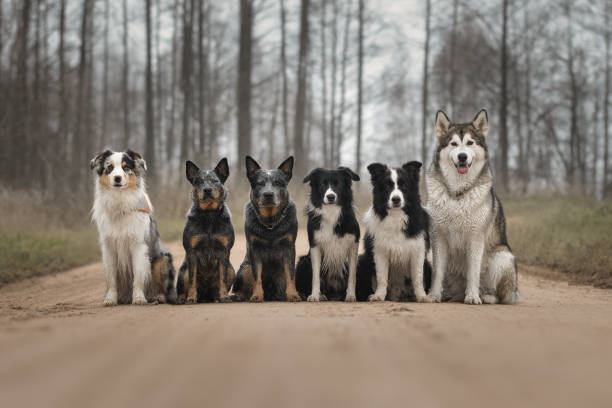Both Border Collies and Koolies are shepherd dogs that are used to work with sheeps on farms. These dogs are energetic and have the tendencies to herd other animal. Choosing between these two could be challenging with all their similarities, differences, strengths and weaknesses.
Since you’re looking for an energetic sidekick or a loving family in search of a loyal companion, We got you covered! Possessing this information will allow you to make intelligent decisions and find the perfect dog to enrich your life in countless ways.
Characteristics of a Koolie versus Border Collie
Border Collies are medium-sized dogs. They are known for their high intelligence and sensitivity. They are protective of their family and have a strong herding instinct. As workaholics, they require mental and physical stimulation to thrive. Koolies are also highly active, intelligent dogs, eager to please, and excellent herders. They are trainable for various tasks and dog sports.
Both breeds are loyal and make great companions with proper training and stimulation.
| Characteristics | Border Collie | Koolie |
|---|---|---|
| Energy | Possessing remarkable energy levels, this dog breed thrives with ample exercise, attention, and mental engagement. | These dogs are characterized by their abundant energy, dedication to work, and playful nature. |
| Intelligence | Displaying impressive intelligence and attentiveness, they have an uncanny ability to anticipate their owner's desires. | Possessing intelligence and diligence, they show remarkable responsiveness to training efforts. |
| Training | Their exceptional trainability allows them to excel in a variety of dog sports, with a particular aptitude for agility and disc dog competitions. | Their exceptional abilities make them stand out in diverse dog sports, where their physical and mental well-being is crucial for success. |
Breed History
The Border Collie is a herding dog breed originating in the border area between Scotland and England. It is believed to have developed from crosses between Roman drover dogs and early Finnish Spitz dogs. Over time, they were interbred with other working and sporting breeds like:
- Beardies
- Setters
- Pointers
- Sighthounds
The term “collie” in old Gaelic referred to anything useful, and the “Border Collie” earned its name due to flourishing in the border region. In 1976, the Kennel Club in Britain officially recognized the breed. The Border Collie Society of America was also established to preserve the breed’s herding instincts and educate judges about the breed.
Originating in the early 19th century, the Koolie is a herding dog native to Australia. Its lineage is a combination of various breeds, including the smooth-coated blue merle Collie and the Black and Tan Collie from Scotland. Crossings with the Australian Dingo, Australian Kelpie, and Border Collie have also influenced this breed.
Early German settlers in Australia brought the breed’s ancestors, also known as the German Koolie. Originally an all-purpose working breed, the Koolie’s development took a turn when one of them accidentally bred with a Dingo, resulting in a short-coated working breed more suitable for the hot climate of the Australian outback.
Appearance Comparison
Border Collies have high-standing ears that often partially fold over at the tip, and their tails are long and bushy. Border Collies always appear alert and have constantly wagging tails.
On the other hand, the Koolie is a robust and muscular herding dog with an athletic physique. They have a tireless and agile gait, with a deep chest allowing ample heart and lung capacity. Their front legs and shoulders are strong.
Size Comparison
It is crucial to understand that each puppy’s growth rate is unique, and there may be variations in size due to individual development and breeding factors.
For owners of Border Collie or Koolie puppies, utilizing growth charts based on age and gender can help estimate their eventual adult size.
Though if you want to see some estimates of their size and weight, the table may help you out:
| Height | Weight | |
|---|---|---|
| Border Collie | The American Kennel Club, or AKC, states that adult male Border Collies should stand between 19 and 22 inches tall, while adult female Border Collies should stand between 18 and 21 inches tall. | Roughly, Border Collies weigh 30 to 55 pounds, with adult females typically weighing 30 to 45 pounds and adult males weighing 40 to 55 pounds. However, weight can vary depending on breeding and individual growth rates. |
| Koolie | Koolies' height can vary more widely, with an average expected size range of 13 to 23 inches, according to the Koolie Club. | Koolies usually weigh between 33 to 53 pounds once fully mature, and there's not much difference between males and females in terms of size. |
Coats & Colors
The Border Collie breed commonly comes in colors such as black and white, brown and white, red and white, and blue merle, which is a grayish coat with black or blue patches. Some rarer colors include:
- White
- Lilac
- Blue
- Gold
- Slate merle
- Brindle
However, pure white coats are uncommon and often avoided by breeders due to potential health issues associated with double merle genes. The Koolie breed comes in various colors, including blue and red merle, solid red, black, grey, and bi-colored combinations.
Personality & Temperament Difference of a Koolie and Border Collie

Border Collies possess distinct personality traits that set them apart from other dog breeds. Renowned for their exceptional intelligence, they quickly grasp commands and respond sensitively to subtle cues. Their abundant energy requires both physical and mental stimulation, finding fulfillment in meaningful tasks and play. As diligent herding dogs, they exhibit unwavering focus and determination in their work. However, their independent nature may present training a challenge, necessitating a positive and consistent approach.
Similarly, Koolies are known for their intelligence, loyalty, and high energy levels. Initially bred for agricultural work, they continue to be used as skilled herding dogs in the Australian outback. Koolies demonstrate obedience, loyalty, friendliness, and patience and possess an upright and intelligent demeanor.
Dogs towards Family
Border Collies and Koolies can be great family pets, but each breed has essential factors to consider. Border Collies are generally energetic, even-tempered, and eager to please, making them suitable for families.
However, they require a lot of mental and physical exercise to avoid behavioral issues, and early training is crucial to manage their herding instincts around others. Active families who can provide ample activity and mental engagement are best suited for Border Collies.
Similarly, Koolies can make good family pets, but they need mental and physical stimulation and energy levels should be considered. They must be better suited for apartment living and need a spacious home or a fenced-in yard. Koolies thrive on human companionship, and being part of the family is essential for their well-being. Families who meet their exercise and socialization needs can find great companions in Koolies.
Kids
Border Collies are highly energetic and athletic, which may require caution when having them around small children. While Border Collies can be affectionate and get along well with kids, it’s important to ensure that children are taught proper interaction with dogs and reciprocate the affection the dog shows them. This is the same reason why having children at least six years old before bringing a Border Collie into the household is generally recommended.
Koolies are known for being playful, energetic, and affectionate around children. They are friendly, patient, and intelligent, making them suitable for active individuals or families with older children. Proper socialization at a young age helps Koolies get along well with small children.
Other People
The reaction of Border Collies toward strangers can vary based on their upbringing and socialization. Due to their history as working dogs, they may display wariness and be cautious or reserved around strangers. Some Border Collies may bark or growl if they feel threatened or don’t trust someone, but aggression towards strangers is not common in this breed. It’s crucial to address any signs of aggression immediately to prevent escalation.
On the other hand, Koolies are generally friendly and welcoming to people. They do not bark excessively and are usually comfortable in new environments and around new people. However, some Koolies may have different personalities, so proper socialization and training are essential for ensuring good behavior around strangers.
Dogs & Other Animals
Border Collies’ relationships with other dogs can vary based on their personalities, socialization, and training. With proper training and socialization, Border Collies can be friendly with other dogs, ensuring a harmonious coexistence within a family.
Similarly, Koolies are not typically aggressive toward other dogs. They generally get along well with other animals when introduced at a young age or handled by experienced owners. While some Koolies may display herding tendencies towards other dogs and household pets, they are not aggressive or harmful.
Behaviour Issues

Dealing with behavioral issues in dogs can be difficult, but several effective strategies exist to address these problems. Below are frequently asked questions by other dog owners who want to tame their dogs and eliminate any possible behavioral issues.
Q1: Why is it important to create a plan before starting corrective training for a dog’s bad behaviors?
A: Before starting corrective training, creating a plan with all household members is crucial to ensure consistency and early action in addressing the bad behaviors.
Q2: Why is it important to offer sufficient sources of amusement for dogs?
A: Supplying dogs with abundant avenues for entertainment is crucial since dogs frequently exhibit undesirable behavior due to boredom. We can effectively mitigate their problematic conduct by offering activities such as chew toys, physical activity, and mental stimulation.
Q3: How can you tell if your dog needs more engagement or has excess energy?
A: If you notice your dog displaying restless behavior, being overly active, or engaging in destructive actions, it may be a sign that they need more engagement or have excess energy that needs to be addressed.
Q4: What approach works best in dog training to curb aggressive behaviors?
A: Dogs respond best to positive reinforcement, so training aggressive behaviors can be more effective by rewarding positive behaviors instead of punishing negative ones.
Q5: How can redirection be used to discourage bad behavior in dogs?
A: Redirection involves guiding the dog towards a preferred behavior or the behavior you want to see, and when combined with positive reinforcement, it can help discourage bad behaviors.
Training & Exercise
Training your Border Collie as early as on their puppy stage is crucial in instilling good habits and prevent behavioral issues in the future. Consistency is essential throughout the training process and this can be done by using the same commands and techniques to avoid confusing your dog.
Remember that Border Collies have short attention spans, so keeping training sessions brief and focused is best. When your Border Collie displays good behavior, remember to praise them, give them treats, and show your affection. Given their high energy levels, regular and ample exercise is vital for their well-being. Engage them in activities like long walks, playing fetch, or other energetic games to help them burn off excess energy and keep them happy and healthy.
For effective training of a Koolie puppy, it is recommended to have 3-5 training sessions a day, each lasting about 5 minutes, to maintain their full attention. The training process for Koolies involves different phases, including:
- Preschool
- Obedience training
- Engaging in dog sports
- Showing and conformation
- Therapy work
Koolies have a natural talent for various dog sports, such as agility, obedience, flyball, and tracking. Providing different exercises and challenges is essential to bring out their best performance. As adult Koolies, regular exercise is crucial to keep their bodies and minds active. Allocating at least an hour daily for activities like walking, jogging, or playing fetch will keep them happy and healthy and meet their exercise needs.
Taking Care & Maintenance of a Koolie versus Border Collie
Caring for a Border Collie or Koolie entails crucial aspects, with diet and exercise being of utmost importance.
| Dog | Koolie | Border Collie |
|---|---|---|
| Diet | Provide your Koolie with premium dry dog food designed for medium-sized breeds. Opt for an active or working breed formula, as Koolies are naturally working dogs and may benefit from this type of food. Ensure you avoid overfeeding your Koolie to maintain a healthy weight and prevent obesity. Consider adding occasionally cooked eggs, fruits, vegetables, and cottage cheese to their diet in moderate amounts as supplements. | You should give your dog a consistent diet and refrain from giving them table scraps or human food. Ensure your dog is fed a nutritious and fresh diet. |
| Exercise | Koolies are known for their abundant energy levels and need considerable attention and exercise. It's essential to ensure your Koolie gets at least 60 minutes of exercise daily, including activities that engage their body and stimulate their mind, like walking and interactive play. For Koolie puppies, restrict exercise to 5 minutes for each month of age to avoid straining their developing muscles and joints. | Provide your Border Collie with a minimum of two hours of daily exercise. Use a leash in hazardous environments, as Border Collies may become too focused on their herding instincts to notice potential dangers or respond to commands. Take regular breaks in hot weather to prevent heat exhaustion, as Border Collies can work or play intensely without realizing the risk. Engage your dog in activities stimulating their body and mind, like agility coursework. |
Grooming Comparison between Koolie and Border Collie
Border Collies have specific grooming requirements but are generally not considered high maintenance.
- Brushing: About three times per week, regular brushing is crucial for Border Collies with thick coats to prevent matting and knotting. During shedding seasons, daily brushing is recommended.
- Nail trimming: To prevent discomfort or pain, nail trimming for your Border Collie should be done at least once a month.
- Trimming: For show standards, minimal trimming around the feet and back of the legs is advised to achieve a neater appearance, but it is not essential for the overall coat health of a Border Collie.
Grooming the Koolie breed is relatively straightforward and requires minimal attention. If their coat is short enough, a grooming glove may be sufficient instead of a brush. Occasional bathing is recommended, as more frequent bathing may remove the natural oils contributing to their coat’s water and weather-resistant properties. Trimming the hair around their paws and feet, cleaning and trimming the pads, and brushing their teeth three times a week are also advised, along with monthly nail trimming.
Shedding
Border Collies have a dense double coat that moderately sheds throughout the year, with more shedding occurring during spring and fall. In these seasons, they shed their undercoat and overcoat to prepare for the changing weather, also known as “blowing their coat.”
On the other hand, Koolies shed, but their shedding is relatively minimal compared to other breeds. They have a short and dense coat that sheds moderately. Regular brushing and grooming can help manage shedding and maintain their coat’s condition.
Health of a Koolie versus Border Collie
Genetic testing is crucial when choosing a new Border Collie puppy due to their predisposition to genetic disorders. Regular check-ups with a veterinarian can lead to early diagnosis and a healthier, happier life. High-quality food with increased protein content is essential to support their active lifestyle and muscle development.
In contrast, Koolies benefit from a relatively clean genetic diversity, contributing to their overall health and longevity. Maintaining their well-being involves regular exercise, mental stimulation, and a balanced diet. Routine veterinary check-ups are equally important for the early detection of any potential health issues in Koolies or any breed.
Life Span Comparison
The average lifespan of a Border Collie is around 12 to 15 years, while the Koolie, a breed similar to the Border Collie, has a median longevity of up to 15 years. Some Koolies have been recorded to live up to 18 years, suggesting a relatively long lifespan. However, individual lifespans can vary based on factors like genetics, overall health, and quality of care.
Diet & Nutrition
Grain should be avoided, as many Border Collies struggle to digest them and may be allergic. If needed, supplements like fish oil and kelp can be added. Alternatively, opt for high-quality commercial food with animal-based protein sources like beef, chicken, turkey, lamb, duck, and fish. Look for a dog formula that offers ample protein, calcium, and carbohydrates to ensure a well-balanced diet for your Border Collie.
To provide a well-rounded diet for Koolies, it’s crucial to include essential components like animal proteins, carbohydrates, vitamins, minerals, and omega fatty acids. Opt for high-quality dry dog food specially formulated for medium or active/working breeds. For added variety, you can supplement their diet with fresh meat, bones, cooked eggs, canned food, fruits, vegetables, and cottage cheese, ensuring that these additions make up no more than ten percent of their overall diet. Remember to avoid overfeeding to prevent obesity and maintain optimal health.
Health Issues
Although Border Collies are generally healthy dogs, they have a predisposition to certain health concerns. Some of the most common issues include:
- Hip Dysplasia: The most prevalent medical problem in Border Collies, hip dysplasia occurs when the hip joint’s ball and socket do not fit correctly, leading to pain, inflammation, and potential arthritis.
- Hypothyroidism: This condition results from an underactive thyroid gland, leading to weight gain, lethargy, and other related issues.
- Dental Disease: Border Collies are prone to dental problems, emphasizing the need for proper dental hygiene.
It is crucial for Border Collie owners to be aware of these potential health concerns and regularly monitor their pet’s well-being to ensure early detection and appropriate management if necessary. Regular check-ups with a veterinarian are essential for maintaining their overall health and happiness.
Koolies are generally known for their robust health, but like all breeds, they can still be susceptible to certain health issues. Here are some common health concerns that Koolies may encounter:
- Blindness and Deafness: Some Koolies may carry the merle gene, leading to blindness and/or deafness in their puppies. Responsible breeders conduct merle testing before breeding to prevent these issues and ensure the health of the offspring.
- Joint Problems: Being highly athletic dogs, Koolies can sometimes experience joint problems, especially as they age. Their active lifestyle, which involves jumping, twisting, and intense physical activity, can strain their joints, leading to potential cartilage and ligament damage.
- Chemical Allergies: Koolies might be more prone to skin allergies or immune system issues, especially in response to certain chemicals like herbicides (e.g., Roundup). While allergies are not exclusive to this breed, it’s essential to be mindful of their exposure to potential allergens to maintain their well-being.
Proactive health monitoring, regular check-ups with a veterinarian, and a healthy lifestyle with appropriate exercise can help ensure the long-term health and happiness of Koolies. Responsible breeding practices and proper care can significantly contribute to their overall well-being.
Comparing Cost of Breeding a Koolie and Border Collie
Breeding a dog involves various expenses that responsible breeders must consider. These costs encompass health checks, vaccines, and deworming, totaling around $350. Additionally, expenses for marketing the puppies and purchasing supplies like collars may range from $10.49 to $60. If a dog sitter is required while the breeder is away, this can add around $150 to the overall expenses.
Feeding a litter of puppies can vary in cost, depending on the food’s quality and the number of puppies. The annual cost of providing good quality food for the puppies can be significant.
Medical tests for the parent dogs may cost several hundred dollars each to ensure responsible breeding and avoid genetically flawed lines.
It’s important to recognize that the total cost of dog breeding can vary based on breed, location, and individual circumstances. Responsible breeders prioritize investing in the health and well-being of the parent dogs and ensuring proper care for the puppies. The total expenses for responsible breeding can range from $7,700 to $23,900.
Puppies
Border Collie puppies go through growth spurts and lulls, resulting in weight fluctuations due to factors like water loss and elimination. By six months, most Border Collie pups weigh approximately 16 to 25 pounds. Their puppy energy necessitates training and behavioral reinforcement, so establishing routines and providing ample exercise to burn off physical energy is crucial.
Koolie puppies have specific health needs, and it’s best to feed them high-quality food for medium-sized dog breeds. Puppies between 8-12 weeks should be fed four meals daily, while those aged 3-6 months require three meals. Two meals a day are appropriate for six months to one year until their first birthday. Overfeeding should be avoided to ensure optimal growth and development.
Breeders & Centers

Conducting thorough research and considering various factors is essential when searching for a reputable dog breeder or center. Start by seeking referrals from reliable sources such as your veterinarian, friends who own dogs, or local breed clubs. Additionally, try to arrange a meeting with the breeder at their kennel or home to observe the conditions the dogs are kept in and ask relevant questions directly.
Before committing, invest time in doing your homework. Look for breeders who prioritize the health and well-being of their dogs and have a positive reputation within the dog community. A responsible breeder will also take a keen interest in determining if you are a suitable owner and will likely ask about your past experiences with dogs and your lifestyle.
Furthermore, consider the breeder’s involvement in breed-related activities, such as clubs, committees, or local and national events. Active participation indicates their dedication and commitment to the breed, a positive sign of a reputable and caring breeder. Following these steps increases the likelihood of finding a reliable source to acquire your new canine companion.
Conclusion: Which Is Better For Me, Koolie or Border Collie?
The decision between a Koolie and a Border Collie ultimately depends on your lifestyle, preferences, and the specific needs of the dog you are looking for. Both breeds are intelligent and active and make great working or companion dogs for the right owner.
If you lead an active lifestyle, enjoy spending time outdoors, and can provide ample physical and mental exercise, either breed could be a wonderful fit. However, if you prefer a dog with a slightly more predictable coat and fewer potential health concerns, the Koolie might be a better choice in that case, as they generally have a healthier genetic diversity. If you are interested in a breed that you are willing to invest time in training and socialization, the Border Collie might be the right companion for you.
Carefully consider your lifestyle, preferences, and ability to meet the needs of either breed before making a decision. The Koolie and Border Collie can be incredible companions, but finding the perfect match for your family and lifestyle is the key to a happy and fulfilling relationship with your new furry friend.



